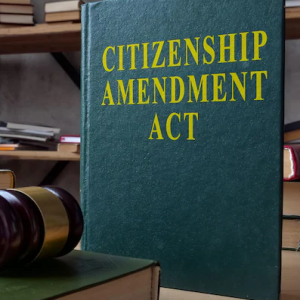
.png) Joseph Maliakan
Joseph Maliakan

The Constitution of India grants citizenship through birth, descent and migration. Religion was never a criterion. The various provisions for the grant of citizenship are codified in Articles 5, 6, 7, 8, 9 and 10. They reflect the basic secular character of the Constitution of India. According to The Citizenship Act 1955 enacted by Parliament, religion is not a criterion to regulate the grant and termination of citizenship. However, with the Amendment and Rules, citizenship will be granted solely based on religion.
The CAA 2019 facilitates the grant of citizenship to persecuted minorities, Hindu, Sikh, Buddhist, Jain, Parsi and Christian illegal migrants from Pakistan, Afghanistan and Bangladesh, who entered India on or before 31 December 2014. The CAA, in violation of the primary secular feature of the Indian Constitution, excludes Muslims from its purview and, therefore, discriminates against Muslims solely based on religion.
The Union Government has argued that the CAA was enacted to provide fast-track citizenship to persecuted minorities in neighbouring countries. Still, the statute or rules do not mention persecution, and proof of persecution is not required before citizenship is granted.
The CAA and Rules also violate the basis of the governance of the states and the union: federalism. Opposition-ruled states Kerala and West Bengal have said they will not implement the CAA. However, under the rules framed by the Union Government, the process of granting citizenship to non-Muslims of Pakistan, Afghanistan, and Bangladesh has been framed in such a way that the states have little or no role.
Citizenship applications under the Citizenship Act 1955 were hitherto made to district collectors, who are under the administrative control of the state governments. The new rules provide for an Empowered Committee and a District Level Committee (DLC) to be set up by the Union Government to receive and process the citizenship applications. Applications will be submitted to the DLC, and the Empowered Committee will decide.
The Empowered Committee will be headed by a Director (Census Operations). It will have as its members an officer of the Subsidiary Intelligence Bureau (under the Ministry of Home Affairs) of the rank of deputy secretary or above, the Foreign Regional Registration Officer (FRRO), the State Informatics Officer of the National Informatics Centre (under the Ministry of Electronics & Information Technology), and the Post Master General (under the Ministry of Communications) of the state. A state home department and Railways representative will be invited to the Committee.
The DLC shall consist of the District Informatics Officer or District Informatics Assistant of the concerned district collector's office, not below the rank of Naib Tehsildar or equivalent, and the railway jurisdictional station master.
The challenges to the CAA 2019 pending in the Supreme Court have pointed out that the Act violates Article 14 because it denies equality before the law and equal protection of laws. Article 14 applies to all persons, not just citizens. The CAA denies fast-track citizenship to Muslims. It also excludes people from countries other than Pakistan, Afghanistan, and Bangladesh. That the Ahmadiyya Muslims in Pakistan are one of the most persecuted minorities is well known, but the CAA is silent on them because of the religious criteria.
The CAA 2019 also does not extend the benefit of fast-track citizenship to persecuted minorities in other neighbouring countries, such as Myanmar and Sri Lanka, where the Rohingya and Tamils are persecuted minorities.
The CAA gives citizenship to the target group of illegal migrants even if they do not have valid travel documents as specified in the Citizenship Act 1955. The CAA presumes that these people who entered India faced religious persecution in these countries and has reduced the period of citizenship through naturalisation from 11 years to five years.
Under the CAA rules, immigrants from the three countries need only prove their country of origin, religion, date of entry to India, and knowledge of an Indian language. The rules regarding proof of country of origin have been considerably relaxed. The earlier requirement of a valid passport issued by Pakistan, Afghanistan, and Bangladesh, along with a valid residential permit from India, has been eliminated.
A birth certificate, educational certificate, identity document of any kind, licence or certificate, or land or tenancy document issued by these countries that prove the applicant was their citizen would serve as proof of citizenship. These documents will be admissible beyond their validity period and can also be used to establish the applicant's religion.
In Assam, the CAA conflicts directly with Section 6A of the Citizenship Act, 1955, which grants citizenship to those who migrated to Assam before 24 March 1971. Even those who came after 1971 but before 31 December 2014 will be granted citizenship with the CAA. But the 1971 cutoff did not discriminate against Muslims; the 2014 cutoff does!